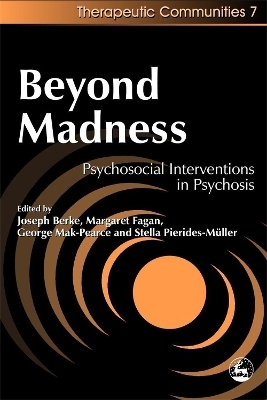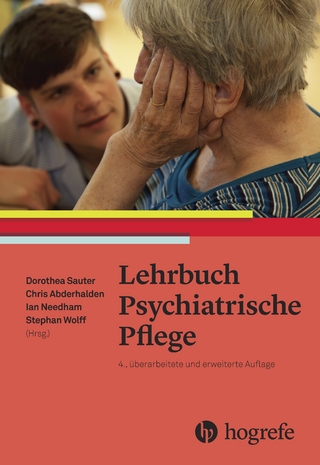
Beyond Madness
Jessica Kingsley Publishers (Verlag)
978-1-85302-889-2 (ISBN)
'This is the seventh volume in the therapeutic communities series and a highly informative and reassuring read for anyone interested in psychodynamic applications, or working with individuals with a mental illness.'
- Therapeutic Communities Journal
'Having no first hand experience of working with mental illness from a psychodynamic perspective, I hoped that this book would provide me with an insight in to the therapeutics of mental illness within a community. The book certainly accomplished this and more. In keeping with the "community spirit" I also feel this book would be of interest to those already in the field, both nationally and internationally, as a means of sharing other therapy experiences.'
- Therapeutic Communities Journal
'The book is basically an account of the Arbours Crisis Centre in London in the words of therapists who have lived and worked there. Part of the therapeutic community movement and the antipsychiatry tradition of RD Laing, the centre has long provided an alternative approach to mental health care. Of course the book goes beyond simply documenting the development of the centre to offer a an implicit critique of mainstream psychiatric treatment and an argument "for a humane, useful and cost-effective alternative to traditional, physical, psychiatric treatments".'
- Mental Health Today
A major question facing therapists today is how to treat psychosis effectively while maintaining patients' dignity, self-respect and, as far as possible, their psychological and social functioning. The authors of Beyond Madness have all been associated with the Arbours Crisis Centre in London, a unique facility established in 1973 where therapists and patients, or guests, live together in order to establish a space where extremes of distress can be tolerated, understood and ameliorated. This book provides important and engaging accounts of the special personal and interpersonal care offered by the Arbours Crisis Centre and kindred facilities.
The authors demonstrate different ways of working with psychotic persons within individual, group and community settings. They describe the extraordinary experience of living and working at the Centre including the five stages of stay that guests invariably pass through. In addition, they discuss different strategies for intervening, especially with people who self-harm, and provide a theoretical framework for their interventions. They explore issues of power, authority and money, and show that the work of the Centre is cost-effective in comparison to other treatment modes.
At a time when biological treatments predominate, Beyond Madness illustrates and argues for a humane, useful and cost-effective alternative to traditional, physical, psychiatric interventions.
Joseph H. Berke, an individual and family psychoanalytic psychotherapist, lecturer and teacher. He is founder and director of the Arbours Crisis Centre and is the author of many articles and books on psychological, political and religious themes. Margaret Fagan, who qualified as a psychotherapist with the Arbours Association in 1989, works as a team leader at the Arbours Crisis Centre and is a senior psychotherapist at Brookside Young People's Unit, Goodmayes Hospital. George Mak-Pearce studied history and philosophy of science at Indiana University and subsequently trained as a psychoanalytic psychotherapist. He worked as a team leader at the Arbours Crisis Centre, and currently works with young adolescents at the Brandon Centre in London. Stella Pierides-Müller, a psychoanalytic psychotherapist in private practice, is also a team leader at the Arbours Crisis Centre. She is co-founder and member of the Association of Arbours Psychotherapists' Borderline Workshop and Arts and Psychoanalytic Workshop, and her main area of work involves borderline psychotic conditions.
Foreword, Robert D. Hinshelwood. General Introduction, Joseph H. Berke, Margaret Fagan, George Mak-Pearce and Stella Pierides- Müller. SECTION ONE: HISTORICAL AND THEORETICAL PERSPECTIVES. 1. Introduction, Joseph H. Berke, Margaret Fagan, George Mak-Pearce and Stella Pierides-Müller. 2. A Psychotic Sense of the Future, George Mak-Pearce. 3. Beyond Medication, Richard Lucas, Consultant Psychiatrist, St Ann's Hospital, London. 4. Continuities, Mats Mogren, Co-Founder and Director, Gothenburg Psychotherapy Institute. 5. The Power of the Play, Stella Pierides-Müller. SECTION TWO: WAYS OF WORKING. 6. Introduction, Joseph H. Berke, Margaret Fagan, George Mak-Pearce and Stella Pierides-Müller. 7. Conjoint Therapy, Joseph H. Berke. 8. Containing Anxiety: A Resident Therapist's Experience, Catherine Sunderland, Resident Therapist, Arbours Crisis Centre, London. 9. Self-Harmers, Margaret Fagan. 10.Teamwork, Tamar Schoenfield, Psychotherapist in Private Practice, London. 11. Stepping on the Cracks, Lizzi Payne, Arbours Crisis Centre, London. 12. The State of the Art, Lois Elliott, Associate Director, Arbours Crisis Centre and Julia Saltiel, Arbours Crisis Centre and Support Programme, London. SECTION THREE: CLINICAL INTERVENTIONS. 13. Introduction, Joseph H. Berke, Margaret Fagan, George Mak-Pearce and Stella Pierides-Müller. 14. Survival or Revival? Martin Jenkins, Co-founder Member, Association of Arbours Psychotherapists Borderline Workshop and Arts and Psychoanalytic Thought Workshop. 15. A Fine Balance: Between Hope and Despair, Lois Elliott, Associate Director, Arbours Crisis Centre. 16. Psychotic Interventions, Joseph H. Berke. 17. Inside Outside, Kate Hardwicke. 18. The Arbours Crisis Centre: Then and Now, Laura Forti, Team Leader, Arbours Crisis Centre. SECTION FOUR: AUTHORITY AND MONEY. 19. Best Value Residential Psychotherapy, Edith David, Financial Administrator, Arbours Crisis Centre, London. 20. The Collapsing of the Pyramid, Stanley Schneider, Professor and Chairman of the Programme for advanced Studies in Integrative Psychotherapy, The Hebrew University, Jerusalem. 20. Conclusion, Joseph H. Berke, Margaret Fagan, George Mak-Pearce and Stella Pierides-Müller. References. Index.
| Erscheint lt. Verlag | 15.10.2001 |
|---|---|
| Reihe/Serie | Community, Culture and Change |
| Co-Autor | Stanley Schneider |
| Verlagsort | London |
| Sprache | englisch |
| Maße | 155 x 233 mm |
| Gewicht | 450 g |
| Themenwelt | Geisteswissenschaften ► Psychologie ► Klinische Psychologie |
| Pflege ► Fachpflege ► Neurologie / Psychiatrie | |
| Sozialwissenschaften ► Pädagogik ► Sozialpädagogik | |
| Sozialwissenschaften ► Soziologie | |
| ISBN-10 | 1-85302-889-4 / 1853028894 |
| ISBN-13 | 978-1-85302-889-2 / 9781853028892 |
| Zustand | Neuware |
| Haben Sie eine Frage zum Produkt? |
aus dem Bereich


